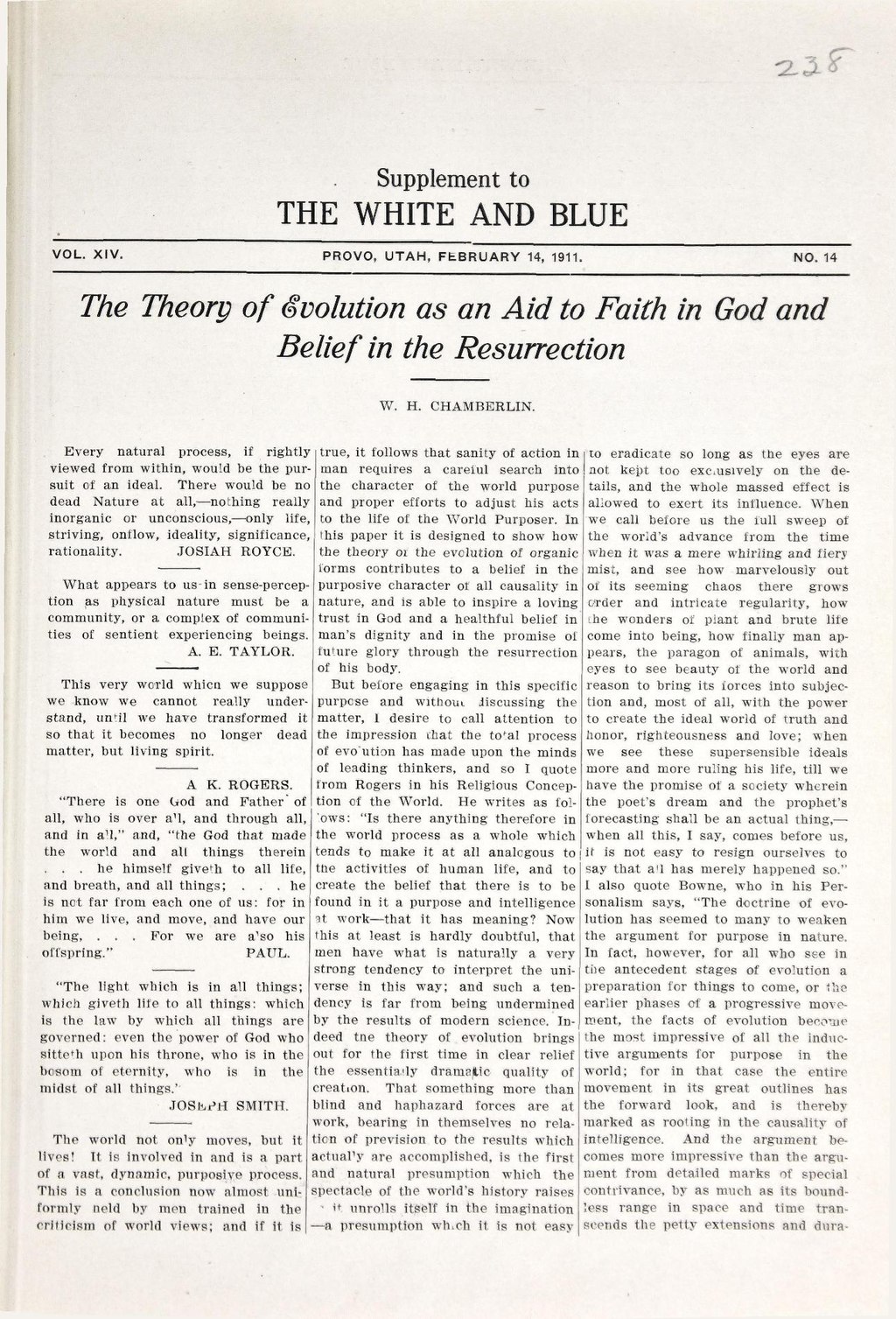Supplement to
THE WHITE AND BLUE
The Theory of Evolution as an Aid to Faith in God and
Belief in the Resurrection
W. H. CHAMBERLIN.
Every natural process, if rightly viewed from within, would be the pursuit of an ideal. There would be no dead Nature at all,—nothing really inorganic or unconscious,—only life, striving, onflow, ideality, significance, rationality. JOSIAH ROYCE
What appears to us-in sense-perception as physical nature must be a community, or a complex of communities of sentient experiencing beings.A. E. TAYLOR.
This very world which we suppose we know we cannot really understand, until we have transformed it so that it becomes no longer dead matter, but living spirit.
"There is one God and Father of all, who is over all, and through all, and in all," and, "the God that made the world and all things therein . . . he himself giveth to all life, and breath, and all things; ... he is not far from each one of us: for in him we live, and move, and have our being, . . . For we are also his offspring." PAUL.
"The light which is in all things; which giveth life to all things: which is the law by which all things are governed: even the power of God who sitteth upon his throne, who is in the bosom of eternity, who is in the midst of all things."JOSEPH SMITH.
The world not only moves, but it lives! It is involved in and is a part of a vast, dynamic, purposive process. This is a conclusion now almost uniformly held by men trained in the criticism of world views; and if it is true, it follows that sanity of action in man requires a careful search into the character of the world purpose and proper efforts to adjust his acts to the life of the World Purposer. In this paper it is designed to show how the theory on the evolution of organic forms contributes to a belief in the purposive character of all causality in nature, and is able to inspire a loving trust in God and a healthful belief in man's dignity and in the promise of future glory through the resurrection of his body.
But before engaging in this specific purpose and without discussing the matter, I desire to call attention to the impression that the total process of evolution has made upon the minds of leading thinkers, and so I quote from Rogers in his Religious Conception of the World. He writes as follows: "Is there anything therefore in the world process as a whole which tends to make it at all analogous to the activities of human life, and to create the belief that there is to be found in it a purpose and intelligence at work—that it has meaning? Now this at least is hardly doubtful, that men have what is naturally a very strong tendency to interpret the universe in this way; and such a tendency is far from being undermined by the results of modern science. Indeed the theory of evolution brings out for the first time in clear relief the essentially dramatic quality of creation. That something more than blind and haphazard forces are at work, bearing in themselves no relation of prevision to the results which actuary are accomplished, is the first and natural presumption which the spectacle of the world's history raises as it unrolls itself in the imagination—a presumption which it is not easy to eradicate so long as the eyes are not kept too exclusively on the details, and the whole massed effect is allowed to exert its influence. When we call before us the full sweep of the world's advance from the time when it was a mere whirling and fiery mist, and see how marvelously out of its seeming chaos there grows order and intricate regularity, how the wonders of plant and brute life come into being, how finally man appears, the paragon of animals, with eyes to see beauty of the world and reason to bring its forces into subjection and, most of all, with the power to create the ideal world of truth and honor, righteousness and love; when we see these supersensible ideals more and more ruling his life, till we have the promise of a society wherein the poet's dream and the prophet's forecasting shall be an actual thing,—when all this, I say, comes before us, if is not easy to resign ourselves to say that all has merely happened so." I also quote Bowne, who in his Personalism says, "The doctrine of evolution has seemed to many to weaken the argument for purpose in nature. In fact, however, for all who see in the antecedent stages of evolution a preparation for things to come, or the earlier phases of a progressive movement, the facts of evolution become the most impressive of all the inductive arguments for purpose in the world; for in that case the entire movement in its great outlines has the forward look, and is thereby marked as rooting in the causality of intelligence. And the argument becomes more impressive than argument from detailed marks of special contrivance, by as much as its boundless range in space and time transcends the petty extensions and dura-
